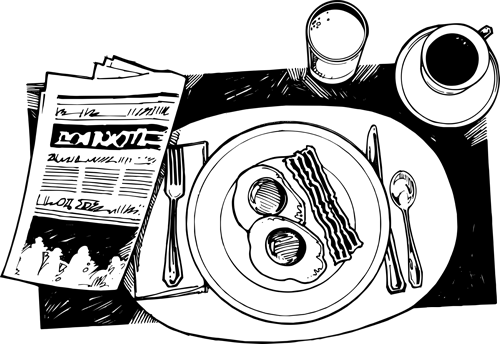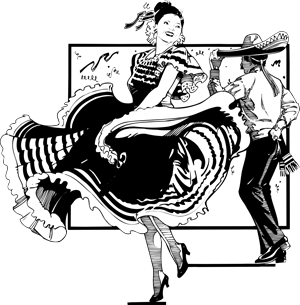The "Pasts" in a Pop Quiz:
Present Perfect and Simple Past
My students know that one of the things I'm picky about is using verb tenses correctly. And, for my German students at least, the pasts seem to be among the most difficult things to master in English, because the grammar seems similar to German, but is different. Look at these two sentences:
- I have eaten breakfast.
- I ate breakfast.

The both mean that my breakfast is sometime in the past, but do they mean the same thing? Nope. Today we're going to review the two time forms, and then take a quick pop quiz. (A pop quiz is a short test given without a warning or announcement.)
Click Here for Step-by-Step Rules, Stories and Exercises to Practice All English Tenses
If you want more information on the pasts, see the worksheet "The Pasts (Part One)" or try some of these other resources:
- Simple Past Tense
- Examples of Simple Past Tense
- Present Perfect Tense
- Examples of Present Perfect Tense
- Simple Past or Present Perfect?
- Simple Past vs. Present Perfect Worksheet
- Common Grammar Mistakes in British English
- Grammar Differences Between American and British English
- Talking about the Past: "Did" and "Have Done"
- "Did" and "Have Done": The Feelings
- English Verb Tenses Made Simple Course, Lesson 03
- English Verb Tenses Made Simple Course, Lesson 04
- English Verb Tenses Made Simple Course, Lesson 06
What is the "simple past" and when do I use it?
The simple past is probably the first form of the past that you learned when you learned English:
- I learned English.
- I walked to school.
It's the "-ed past," formed by adding -ed to a regular verb. (You have to memorize the simple past forms of the irregular verbs, I don't know any tricks.)
You use the simple past with finished times. A finished time is any time that is over. Yesterday is over, so is last week and last Christmas. 1997 is also over. So, if you want to talk about these, you use the simple past:
- Susan called me yesterday.
- We had a lovely family gathering last Christmas.
- I moved here in 1997.
- She was a successful model.

If you want, now is a good time to brainstorm some times in the past and to form sentences using them. Remember to use the simple past!
What is the "present perfect" and when do I use it?
The present perfect is what you might call the "have past." It's the form of the past formed by using the helping verb "to have" and the past participle of the main verb you want to use.
Examples:
- The new President hasn't been President very long, but he has made some good decisions already.
- Have you visited Bite Sized English before?
- I have eaten breakfast already.
You use the present perfect with unfinished times. This is the simplest contrast between the two time forms:
when something has happened in the past, but in a time that is "unfinished" you use the present perfect. Some examples of times that are not finished are "this year," "so far today" and "since I graduated from college."
If you talk about what you've done at your job – and you still have the job – you want to use the present perfect, since the job isn't finished.
Examples:
- I have eaten breakfast today.
- She has done good work since she started working here.
- I haven't met the Dan since we graduated.
- They have started dancing already.

One last difference: finished and unfinished actions
The hardest thing to learn is to know when to use the different forms of the verbs when you don't name a time at all. How do you know if you're talking about unfinished time or finished time when you're not saying a time? It's difficult to explain.
The first rule I can suggest is this:
in American English, it's almost never wrong to use the simple past. If you're not sure, it's always okay to use the simple past. But using the present perfect correctly will make your English sound more polished, more "intelligent," if you will. And so, here's some advice:
- If you're talking about things you've done in your life, use the present perfect because your life isn't over. Of course, this might sound obvious, but we don't often say "I have never gone to Paris in my life." We just say, "I have never gone to Paris." and the present perfect tells the listener we're talking about our entire lives. Some examples of this are:
- Have you ever skied?
- I have learned German and now I'm working on French.
- He has never held a real job, what does he know?
- We use the present perfect for unfinished actions. It might be hard to imagine an unfinished action in the past, because it's not an action we're doing right now, we use the progressive tense for that. But there are many things you have worked on in the past, but didn't finish yet.
For example: "I have learned some basic French vocabulary."
I'm certainly not finished learning, I can barely introduce myself.
Or, if my wife wants to know what my plans are for the next vacation I say "I have planned to visit my parents and my friend Ryan." When I use the present perfect, I tell her that the plan isn't finished, she can tell me what she wants to do. If I told her that in the simple past, she might get upset, thinking I didn't care about her opinion.
Some examples include:
- My mother has visited London once. (In her life. But she's coming again.)
- We haven't had any children. (But we want to!)
- My English teacher has taught me a lot of vocabulary. (And we hope he isn't finished.)
- And there is one last rule of thumb: we use the present perfect for actions in the past that have an effect on the present. Does it sound crazy? It isn't, really.
What the rule says is this: after my car accident, when I was having a lot of stress with the replacement car and the paperwork, I told my friends: "I have had a car accident." That's because I still had a lot of stress in my life – there was an effect on my life – and I wanted to let them know that. Now, however, the stress has subdued and when I talk about the accident I use the simple past: "I had an accident."
Here are some more examples:
- I have eaten breakfast. (So I'm not hungry: that's the effect of the action.)
- He has learned English. (Now he speaks English, that's the effect.)
- My wife hasn't eaten. (So, you can assume she's hungry.)
Does it seem like a lot? It is, but it's something you can learn with practice. Try the quiz to see how well you've learned (and internalized) the grammar.
Get Updates, Special Offers, and English Resources
Download your FREE GIFT (the first two chapters of
English Short Stories Book and Workbook)
as soon as you join!

By submitting your email, you consent to receiving updates and newsletters from us and to the sharing of your personal data with third parties for the purposes of sending you communications. We will not spam you. You can unsubscribe at any time. For more information, please see our privacy policy.





